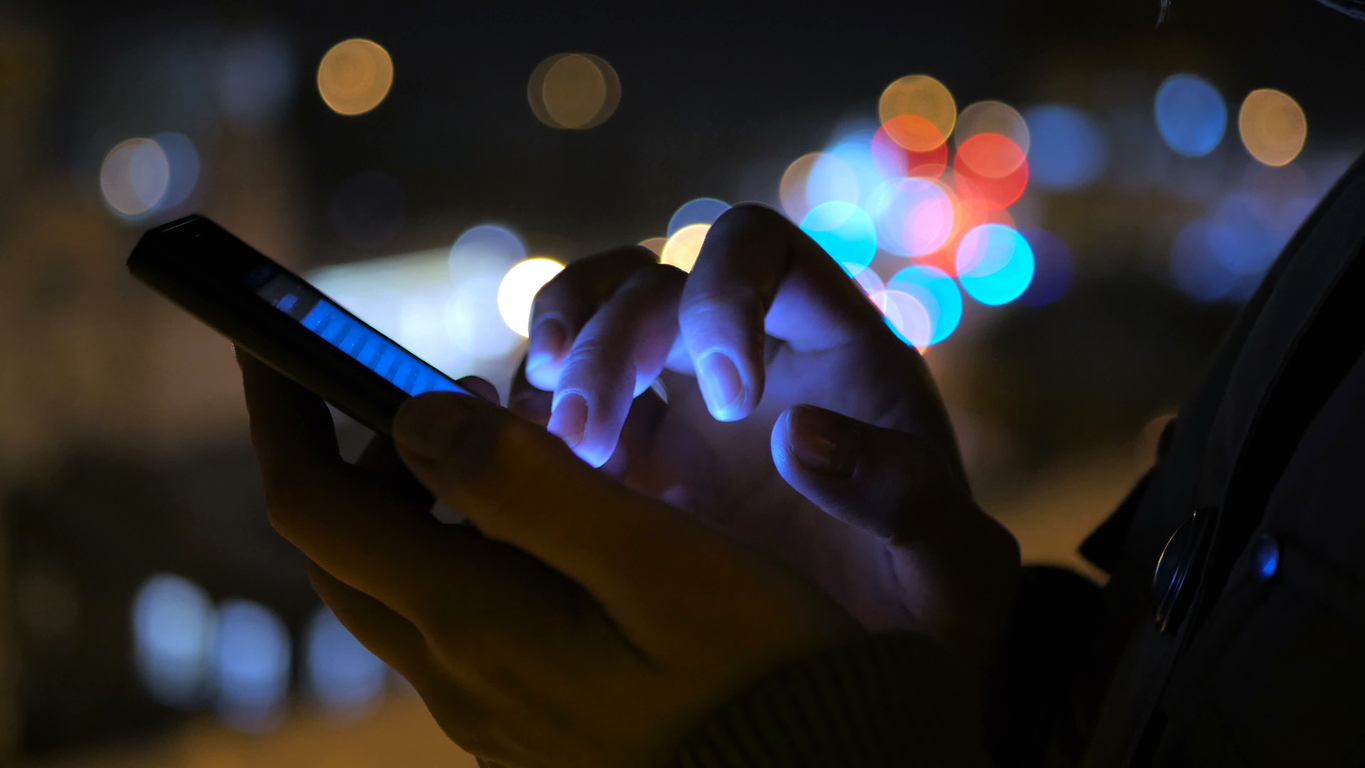Latest Sleep Research: Does Blue Light Filtering “Night Shift” Really Help Sleep?

Have you ever wondered whether your iPhone’s blue-light filtering “Night Shift” mode actually improves sleep? Did excessive screen use during COVID-19 negatively impact sleep and circadian rhythms? Check out this month’s new research article for the answers!
Article 1:
Electronic devices, particularly smartphones, laptops, and tablets emit bright blue light that may affect sleep-wake patterns. The iPhone’s iOS feature “Night Shift” was released in 2016 and replaces bluer tones on the phone screen with warmer, amber hues. A recent study by Brigham Young University researchers published in the journal Sleep Health examined whether the iPhone’s blue light filtering Night Shift mode has an effect on sleep.
Researchers randomly assigned a group of 18-24 year old’s into one of three conditions before bedtime: 60 minutes of iPhone use with Night Shift turned on, 60 minutes of iPhone use with Night Shift off, and users who did not use their iPhone at all before bed. Participants were instructed to keep the phone at its lowest screen brightness and continue with their assigned condition for 7 days, while tracking their sleep with an arm monitor called actigraphy.
Contrary to expectations, the authors found that those using the Night Shift mode did not have any better sleep than those not using the Night Shift Mode. Indeed, the study found no differences in sleep improvement among this sample of young adults using the feature. In fact, the authors found that participants who regularly obtained sufficient sleep had better sleep while abstaining from screen use entirely versus using the Night Shift mode.
Despite these findings, it may be premature to abandon all bright light filters for sleep improvement. The authors in this study instructed participants to keep their phone brightness at the lowest level. The Night Shift mode may be beneficial for those working late nights with their screen on high brightness. The authors also did not investigate Night Shift’s impact on sleep when using devices with larger, brighter screens. For example, further research is needed to determine the effect of Night Shift mode – and other blue light filtering devices or applications – on large laptop screens and tablets. Nonetheless, the adverse effects of bright, short-wavelength blue light on sleep and circadian functioning are well-known. And, alternative blue-light blocking filters – particularly amber lenses – have been shown to improve sleep quality and mood.
Article 2:
Were you guilty of using your bright screens and devices more than usual during lockdown? Prolonged nighttime exposure to bright light (especially blue light emitted from electronic devices) may negatively affect sleep health. A recent study published in the journal SLEEP studied the relationship between changes in evening screen usage and sleep-wake patterns during the COVID-19 lockdown. Over 2,000 Italians were tested with longitudinal (long-term) web-based surveys during the third and seventh week of lockdown. The authors expected that changes in electronic device usage during the lockdown would be associated with either sleep improvement (if screen exposure was reduced) or sleep disruption (if screen exposure was increased).
The authors found a strong relationship between screen usage and sleep change during lockdown. As expected, people reporting an increase in screen time during the 2 hours prior to sleep had worse sleep over time. Specifically, this increase in electronic device usage was associated with worse sleep quality, aggravated insomnia symptoms, less total sleep time, an increase in time taken to fall asleep, and a delayed circadian rhythm – participants who spent the most amount of time in front of a screen fell asleep and woke up later. Furthermore, those with elevated screen time usage reported higher levels of insomnia symptoms.
Interestingly, the opposite was found for those reducing the amount of screen usage before sleep. Individuals spending less time in front of their devices showed an improvement in sleep quality and reduced insomnia symptoms. These participants also went to bed earlier after four weeks of lockdown. Finally, no changes in sleep or circadian rhythms were found among people who maintained their screen usage.
These findings suggest that sleep hygiene tips such as limiting bright lights before bedtime may be beneficial for improving sleep during lockdown. It’s important to note that this study relied on self-reported measures of sleep and screen use. Further research using objective sleep detection is needed to confirm the author’s findings. Nonetheless, avoiding excessive bright electronic screens before sleep may support sleep and circadian health during pandemic lockdowns.
Excessive Screen Use And Bright Lights May Impair Sleep-Wake Functioning
Together, these findings highlight that excessive screen use 2 hours before bedtime may impair sleep and circadian rhythm functioning. Furthermore, the iPhone’s built-in “Night Shift” mode appears to have a limited effect on improving sleep when used on low-brightness smartphones. Nonetheless, light is one of the single most powerful environmental cues influencing our sleep and circadian rhythm. Continued research and validation studies on recent bright blue light filtering technologies and methods are still needed – particularly during COVID-19 as our use of electronic devices are on the rise.
SleepScore Labs Solutions
Download the free SleepScore App for insights and articles on how well you sleep, the quality and quantity of your sleep cycles, and sleep improvement progress with science-backed tips and insights. Download it for free from App Store and Google Play Store!
You can also visit the SleepScore Store for a wide range of sleep-promoting products carefully curated by SleepScore Labs’ team of researchers including lighting solutions and more to support your sleep-wake schedule!
Sleep well!
Article 1:
Jeremy A. Bigalke, Ian M. Greenlund, Jennifer R. Nicevski, Jason R. Carter,
Effect of evening blue light blocking glasses on subjective and objective sleep in healthy adults: A randomized control trial, Sleep Health, 2021; https://doi.org/10.1016/j.sleh.2021.02.004
Article 2:
Federico Salfi, Giulia Amicucci, Domenico Corigliano, Aurora D’Atri, Lorenzo Viselli, Daniela Tempesta, Michele Ferrara, Changes of evening exposure to electronic devices during the COVID-19 lockdown affect the time course of sleep disturbances, Sleep, 2021; https://doi.org/10.1093/sleep/zsab080